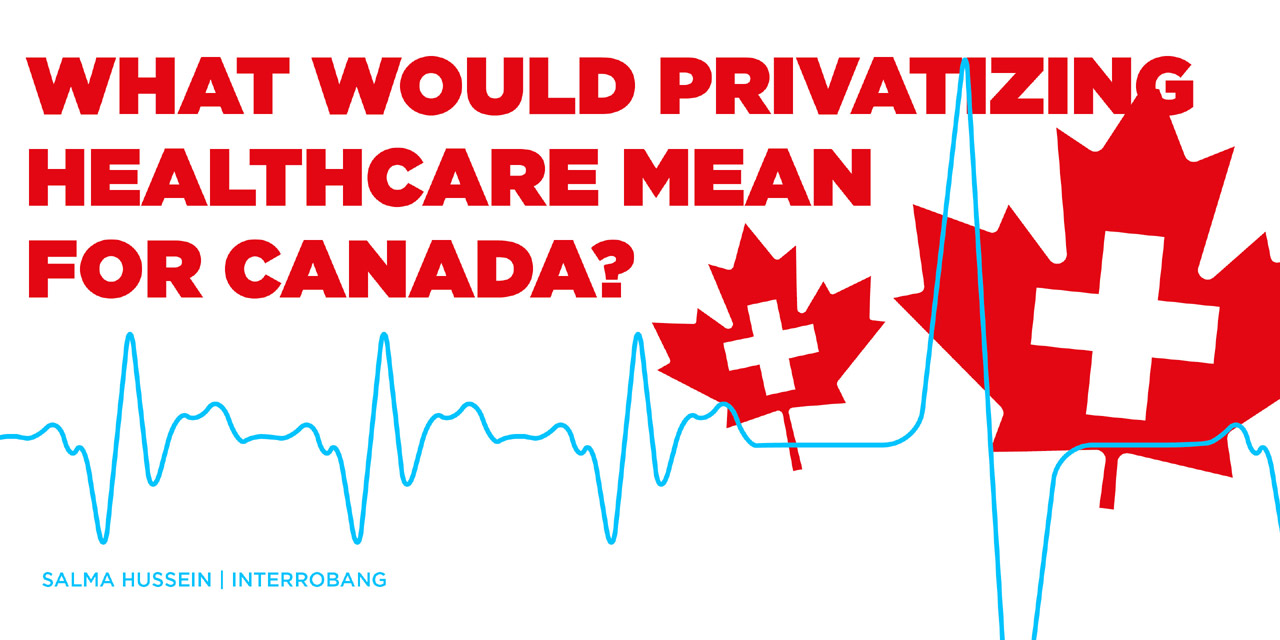What would privatizing healthcare mean for Canada?

In Canada, we enjoy the benefits of free public healthcare systems.
Healthcare today is provided on an as-needs basis, instead of on who has enough cash to acquire it. This system ensures free medical care to those with a Canadian citizenship, no matter their income. Considering privatization of Medicare would jeopardize the access to health services for all.
People may suppose if Medicare was privatized, those with money can get better and faster access to healthcare whenever they need it, but that won’t necessarily be the case. According to a 2019 article from theconversation.com by Sarah Giles (lecturer in Family Medicine, Faculty of Medicine, L’Université d’Ottawa/University of Ottawa), Danyaal Raza (family physician and assistant professor, University of Toronto), and Rupinder Brar (clinical assistant professor, University of British Columbia), titled “Why private, for-profit healthcare is a terrible idea,” the population as a whole, wealthy or not so much, would suffer. The article emphasizes the definite increase in prices, longer wait times, and predicted limited access to healthcare services.
Canadians risk spending more on unnecessary tests that will cost a lot of money each time we seek out healthcare services. The cherry on top is that these unnecessary procedures can be invasive and, in the end, don’t better the health of individuals. In addition, the article remarks on how expensive treatments will be at forprofit clinics.
Cancer chemotherapy fees, for example, would cost more than public non-profit healthcare institutions. The increase in fees would naturally drive people to seek out public services, and thus wait times would increase, and more and more people won’t be able to receive necessary cancer treatments.
According to a scholarly article titled “Privatizing health care is not the answer: lessons from the United States” by Marcia Angell, for-profit healthcare in the U.S. is more expensive and often of lower quality than not-for-profit or government care, with much higher overhead costs. Following in the footsteps of our neighbours down south usually doesn’t end on a good note, and Medicare privatization is no exception.
Healthcare should not be a privilege, but a right. That is why Medicare should continue to be provided on an as-needs basis, and not discriminate based on wealth or lack thereof.
The Ford government is pushing for healthcare privatization on the pretense of reducing wait times and better funding health care. An example of this is the passing of Bill 175 in June, which proposed to gut existing home and community care legislation and, according to the Ontario Health Coalition, enable privatization of home care.
However, as mentioned before, privatization will only make wait times worse and increase costs of many essential treatments. Giles, Raza and Brar suggest alternative solutions such as pilot projects that reduce wait times for procedures and use of MRIs. Other alternatives include the “eConsult” project designed to provide virtual access to physicians and specialists. This project reduces wait times and in person consultations, commonly used now because of the pandemic. These methods, among many more initiatives, are better and cheaper alternatives to privatization of healthcare. Methods such as virtual consultations will help Canadians keep money in their own pockets, and even ameliorate the kinks in our current healthcare system.
Privatization means that everyone would need healthcare insurance, and that adds to an individual’s yearly costs. Canadians who are below the poverty line, and those who make $40,000 a year (considered above the poverty line, even though it is well known that those individuals struggle as well) will have trouble in procuring an insurance to cover partial healthcare expenses let alone all of them. Those who cannot obtain an insurance will have to wait longer for necessary procedures while those who are insured will not have as much trouble.
In times like these, where microorganisms risk the livelihood of many Canadians, the need for an accessible healthcare system is more imperative than ever. Benefits like free screening for COVID-19, and a free potential vaccine in the future are the reasons why free Medicare is essential and privatization would bring the country backwards in terms of healthcare accessibility.
Americans who are uninsured may have to pay out of pocket for the future vaccine, according to a Healthline article titled “How much will you pay for a COVID-19 vaccine? Here’s what we know,” by Shawn Radcliffe. Trudeau however, confirmed that when there is an approved vaccine, it will be free for all Canadians (Global Citizen by Sarah El Gharib).
Privatization of healthcare, all in all, for Canada would be a bleak future for access to healthcare for Canadian citizens. Instead of trying to make the healthcare system we have only accessible to those who have money, more resources into making healthcare better and accessible to all should be considered. Privatization will also impact the economy negatively by increasing overall costs on healthcare, and thereby increasing yearly costs for the average Canadian. Insurance is not something all Canadians will be able to procure and therefore limiting the access of healthcare services for all. The Ford government is looking out for only the wealthy when considering Medicare privatization. We know that this system is not working for citizens of the U.S., in fact it has been detrimental to their ability to access healthcare services, so why should we be considering it at all?
Editorial opinions or comments expressed in this online edition of Interrobang newspaper reflect the views of the writer and are not those of the Interrobang or the Fanshawe Student Union. The Interrobang is published weekly by the Fanshawe Student Union at 1001 Fanshawe College Blvd., P.O. Box 7005, London, Ontario, N5Y 5R6 and distributed through the Fanshawe College community. Letters to the editor are welcome. All letters are subject to editing and should be emailed. All letters must be accompanied by contact information. Letters can also be submitted online by clicking here.















